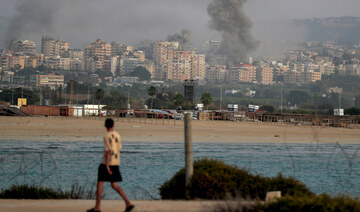ANKARA: Following its lawsuit to ban the pro-Kurdish Peoples’ Democratic Party (HDP), the Turkish government’s crackdown against the party escalated on Friday morning, with dawn raids carried out on houses in Istanbul, Ankara and several other cities detaining dozens of people, including local HDP executives.
The government claims the HDP has ties with the outlawed Kurdistan Workers’ Party (PKK) which the HDP denies.
On March 17, a prosecutor filed a case with the Constitutional Court of Turkey to ban the HDP, the third largest party in the Turkish Parliament, representing 6 million voters at the 2018 election
The move, criticized by the US and the EU, was denounced by the HDP as a “political coup” not based on legal grounds.
“Even after all of (President Recep Tayyip) Erdogan’s authoritarian repression against his political opponents, actually shutting down an opposition party always seemed like a bridge too far,” Merve Tahiroglu, Turkey program coordinator at the Project on Middle East Democracy (POMED), told Arab News.
“Given that Erdogan himself has suffered from anti-democratic party closures throughout his political career, it may still prove too politically costly for him to pursue the closure of the HDP,” she added.
Erdogan’s ruling Justice and Development Party (AKP) survived a closure case of its own in 2008 after an indictment brought by the then chief prosecutor, seeking to bar it and its leaders from politics. The Constitutional Court decided instead to cut the party’s state funding due to its “anti-secular” practices.
According to Tahiroglu, the latest government moves to ban the HDP from the political scene, and the recent crackdown on party officials, aims to appease the AKP’s far-right coalition partner, the Nationalist Movement Party.
But, she said, even the threat of closing down the HDP would benefit Erdogan by driving a wedge in the opposition coalition, forcing politicians to either come out in support of the move, thereby alienating liberal and Kurdish voters, or oppose the move, alienating nationalists.
On Thursday, former Turkish President Abdullah Gul, a staunch critic of Erdogan, warned that attempts to close the HDP will damage Turkey greatly, adding that similar moves against pro-Kurdish parties in the past had resulted in “Turkey’s isolation.”
Despite up to 600 officials facing expulsion from political life, the HDP is expected to regroup under a new brand, but with similar ideological beliefs, if officially closed.
“The ongoing crackdowns against the HDP are bad enough for Turkish democracy. But given the Biden administration’s emphasis on democratic values, the closure of an opposition party should be a red line,” Tahiroglu said.
In Ankara, Ozturk Turkdogan, the chairman of Human Rights Association (IHD), was also detained during the raids, with no official statement given as to why.
Turkdogan was recently criticized by Interior Minister Suleyman Soylu after he condemned the government for risking the lives of 13 people during a military operation in northern Iraq’s Gara Mountains, where Turkish hostages were being held, and were later executed, by the PKK.
Soylu reacted angrily to Turkdogan’s criticism, calling the IHD a “cursed association.”
The IHD has previously acted as an intermediary between the PKK and the state to return hostages, including 20 captives who were returned to Turkey in 2015.
Turkdogan also recently criticized the government’s new Human Rights Action Plan, claiming that it was little more than window dressing, and that it should include measures to protect human rights activists and associations.
The International Commission of Jurists (ICJ) released a statement on Friday, calling for the immediate release of Turkdogan.
“The arrest and search of Turkdogan’s (house) continues a systematic pattern of misuse of criminal law to harass and persecute human rights defenders and lawyers in Turkey in recent years,” said the ICJ’s Europe and Central Asia Program Director Roisin Pillay.
“Turkdogan must be released immediately. If he remains in detention then he must be ensured immediate and confidential access to a lawyer, and be informed of the nature of any charges against him and brought promptly before a court.”




























